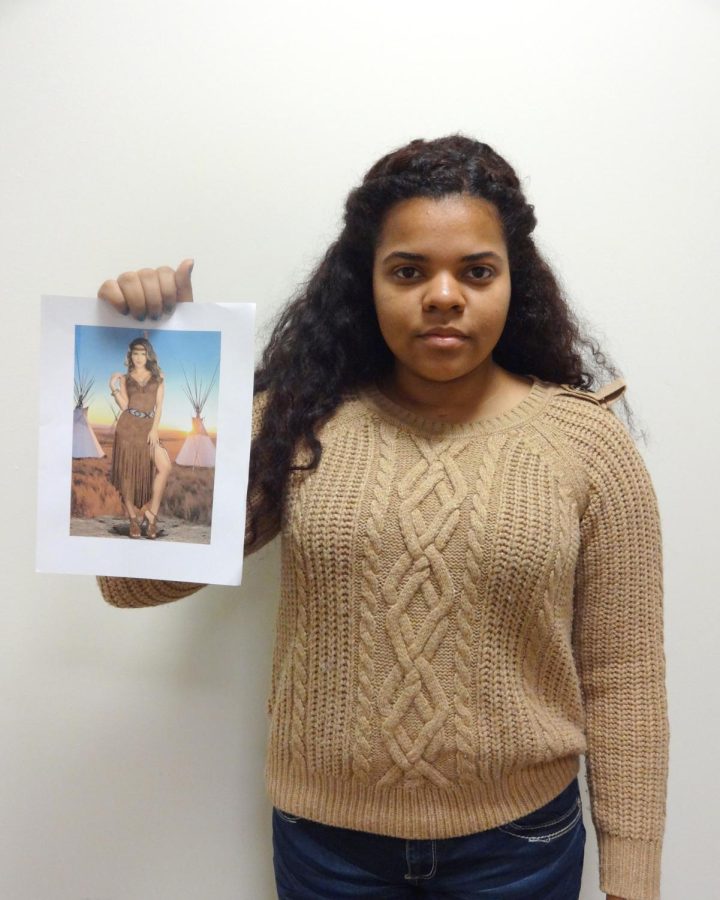Costumes highlight cultural appropriation
President of the Native American Student Association, Chelsea Ford, holds up a picture of a “Native American” costume.
October 28, 2015
Halloween is the time for people to dress up as a vampire or mummy, or their favorite television character or superhero. However, some costumes have started to cross the line.
For several years, people have started to use different cultures and ethnicities as Halloween costumes.
“’What made you think that would be a good idea?’ That would be my first words to them,” said Chelsea Ford, president of the Native American Student Association (NASA).
An example of an offensive costume includes dressing as a Native American, wearing fringe and colorful feathered headdresses.
Ford said the feathers used on headdresses are meaningful and it loses that meaning once it becomes a costume. She said these costumes create negative stereotypes for different cultures and that the costumes don’t show how the people of these cultures actually are.
“I don’t get up every morning and say, ‘Today, I’m really going to try and be Native American. I’m going to dress up like how Native Americans are supposed to dress up as,’” Ford said.
The chairperson of Pan-African Studies, Amoaba Gooden, said costumes that represent someone’s ethnic background shouldn’t be treated as a joke.
“They’re not costumes to be adorned. They are actually part of someone’s ethnicity,” he said.
Gooden said these costumes are portraying different cultures in a negative way and this is the height of cultural appropriation.
“If a five-year-old child can dress up as a terrorist or a Native American, how is that child going to think of those people?” she said.
Fawaz Alharbi who is from Saudi Arabia said these costumes are disrespectful.
“They’re making fun of my culture. They don’t respect my religion,” he said.
In this case, donning a hijab, turban or burka as a costume may seem innocent to some, but is ultimately offensive to those close to the culture.
Alharbi said that he’s experienced racist remarks on campus including a guy yelling, “ISIS” at him.
“They have the wrong perspective about us,” he said.
Maria Rodriguez, a member of the Spanish and Latino Student Association (SALSA), said she finds it offensive when people dress up as another culture that is not theirs.
“Most of the time it’s to make fun of it, they’re making fun of a whole culture,” she said.
Rodriguez said the people wearing these costumes don’t even know what they’re wearing half the time.
Cam Rhodes, a senior theatre studies major, said he doesn’t get offended easily but can understand others perspective because of the negative stereotypes.
“People work really hard to get those negative comments down,” he said.
Darius Brown, a sophomore in psychology, said dressing up in another person’s culture to make fun of it can be emotionally and mentally harmful.
“You’re trying to downgrade a culture,” he said. “People can think they are downplaying them or saying their culture is a joke.”
He said these cultures are trying to avoid the stereotypes that people in costumes are portraying.
Gooden blames the companies that are making money off of a group of people who don’t make sufficient funds to survive. The people who buy and wear these costumes are contributing to those corporations.
“You’re buying someone’s culture for 24 hours, but then you change out of it and you still maintain your privilege,” Gooden said.
Ford said that her culture is not a costume, and putting on these costumes mock cultures and don’t tell the real meaning.
“You can’t be a culture for one day,” she said. “It’s blinding you try to portray yourself as one thing, but other people are portraying you differently.”
Itzzy Leon is the ethnic affairs reporter for The Kent Stater. Contact her at [email protected]

























